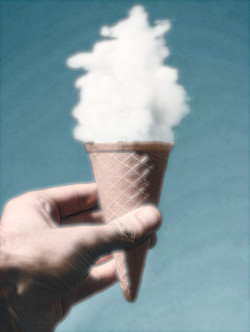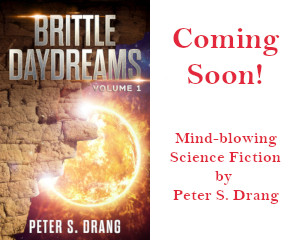
In a previous post I discussed some techniques for generating new story ideas from dreams. But that’s not my only source of inspiration. In this post I’ll discuss how I use everyday events to create premises for new science fiction and fantasy stories.
The “What If?” Moment
The basic concept is simple. You’re in the middle of doing something. It might be something you’ve done a thousand times, or it might be unique. It might be something someone says to you, or even something you mishear. You take that basic experience and you layer a “what if?” on top of it and–Bam!–it’s now a premise for a new science fiction or fantasy story.
Let’s look at some specific examples from my own stories to illustrate the process.
Example: Weed
My story “Weed” (read it HERE) was inspired by a conversation about grammar. A person I know was talking about intransitive verbs, and all the sudden that became a science fiction story!
Here’s how it happened: She made the claim that if someone says “The trees felt dry” it was obvious from context that the person talking was feeling the dry bark with their hands, because trees don’t feel anything themselves. I said to myself, well, that’s not necessarily true in science fiction and fantasy. Challenge accepted! I set out to write a story in which the very first line was “The trees felt dry” but with the twist that it really did mean the trees were having the feeling “dry.”
I did some research and found that indeed there is some scientific evidence that plants communicate with each other (chemically) and might have some primitive kinds of feelings, so I decided on science fiction rather than fantasy for the story.
Once I had the premise, I had to design characters who would highlight the premise. How about a scientist who can actually understand how plants are feeling? I’ll have future posts about how to take a premise and turn it into a plot, characters, and a story.
Example: Harvest Park
Harvest Park (read it HERE) was inspired by a visit to a water park with my family. SPOILER ALERT! This analysis might ruin the story for you, so read the story first.
Here’s how it came about. My sons, wife, and I took a vacation to a large water park. We were in a wave pool very much like the one described in the story (sans knives). At the park I started to think about how there was actual danger, at least a little, on all the rides. Every year you hear about a few people being killed in action parks. Here’s where the “what if” comes in: What if there was a park designed to purposely kill a small percentage of riders?
From that premise, I had to figure out why anyone in their right mind would attend a deadly action park. While pondering this, I read an article about the lack of transplant organs in the USA. One reason for the shortage is that cars are much safer than the used to be, which in a perverse way causes deaths: it dries up the “production” of young, healthy transplant organs from car accidents.
Once I had those two concepts it was simple: There’s a planet that has lots of parasites that destroy organs over time, but everything in this society is safe so few organs get donated. Parks are designed to “harvest” organs. People voluntarily subject themselves to the risks because they earn credits to bid on organs that they or their family members will eventually need. There was still work to do to turn those concepts into a plot, of course, but this cool premise gave me a lot to work with.
Example: Outstanding Customer Service
The story Outstanding Customer Service (read it HERE) was of course inspired by sitting on hold with a telephone customer support person from India. Sometimes it was hard to communicate due to language differences; I’m sure many of us have experienced this. I started thinking, what if alien races outsourced their customer support to Earth? What types of moral dilemmas might we face once we interact with beings whose moral codes may be far different from our own? Could we, by helping them use consumer products, actually be helping them perform evil acts?
Now one issue with this story is that “weird customer support” stories are a bit of a cliche. Some markets’ submission pages even warn against sending them stories specifically like this. In most of the cliche stories along these lines, a bored customer support person handles something odd like a magic wand and crazy things happen. My story is quite a bit different than the usual take, because the main character is far from a bored participant, she takes a very active role and turns the tables on an evil alien. But still, a cliche is a cliche.
I knew all this before I wrote the story, but I wanted to write it anyway because I thought it would be fun. I didn’t even submit it anywhere, thinking it would be rejected by first readers due to the subject matter. Shortly after posting it to this website (thus making it unsellable!) I saw a story in IGMS about customer support for a magic item! Ha! So much for submission guidelines applying across different markets. Lesson learned.
Summary: The General Method
So what’s the general method here? Simply this: be observant even in the most mundane situations. Let your mind wander. Magnify what’s happening around you; take it to the nth degree. Any situation, from the most mundane (being stuck on hold with customer service) to the most random (an offhand comment about grammar) can inspire a story if you’re vigilant and you keep asking yourself the question: What if?
Write those random thoughts, those “What if?” moments down in your IDEAS file. Sometimes combining two or more of those ideas can make a compelling story.
Once you have that kernel of an idea, premise, or scenario, there’s still a lot of work to do. You need to design characters to illustrate the premise, and you need a plot that makes sense and has a satisfying ending. I’ll go through all those steps in future posts!
For now, keep daydreaming, and keep asking, “What if?”
SEE ALSO: How to Dream Up New Science Fiction Story Ideas
SEE ALSO: The Short Story Funnel



Pingback: What Does Gator Hear? Author's Notes on "Gator and the Big Buzz" — DrangStories.com
Pingback: Mixing Ingredients to Create New Science Fiction Stories — DrangStories.com
Pingback: Story: Harvest Park — DrangStories.com
Pingback: How to Dream Up New Science Fiction Story Ideas — DrangStories.com